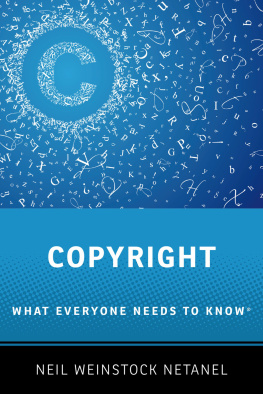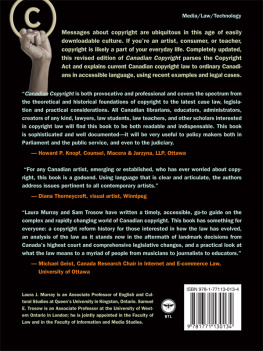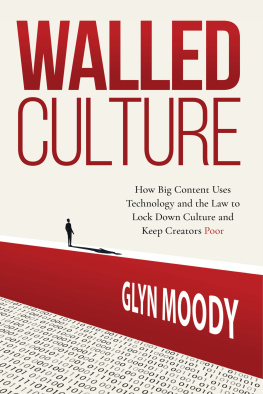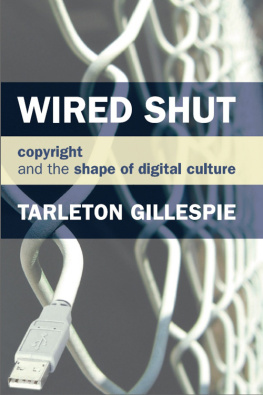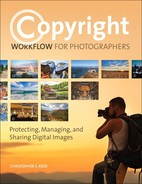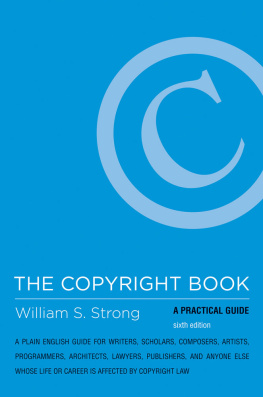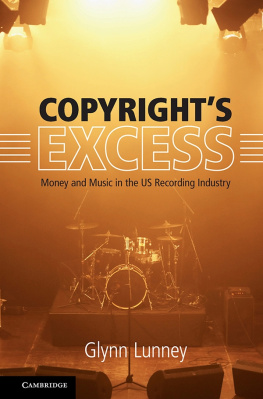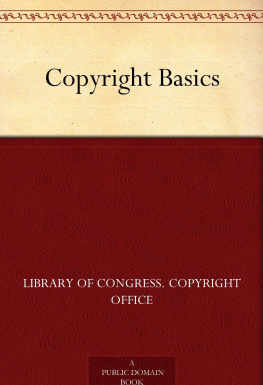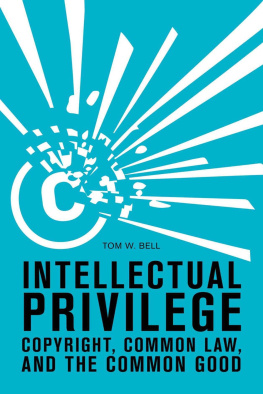COPYRIGHT
WHAT EVERYONE NEEDS TO KNOW

Oxford University Press is a department of the University of Oxford. It furthers the Universitys objective of excellence in research, scholarship, and education by publishing worldwide. Oxford is a registered trade mark of Oxford University Press in the UK and certain other countries.
What Everyone Needs to Know is a registered trademark of Oxford University Press.
Published in the United States of America by Oxford University Press
198 Madison Avenue, New York, NY 10016, United States of America.
Oxford University Press 2018
All rights reserved. No part of this publication may be reproduced, stored in a retrieval system, or transmitted, in any form or by any means, without the prior permission in writing of Oxford University Press, or as expressly permitted by law, by license, or under terms agreed with the appropriate reproduction rights organization. Inquiries concerning reproduction outside the scope of the above should be sent to the Rights Department, Oxford University Press, at the address above.
You must not circulate this work in any other form and you must impose this same condition on any acquirer.
CIP data is on file at the Library of Congress
ISBN 9780199941162 (pbk.)
ISBN 9780199941148 (hbk.)
ISBN 9780190883188 (epub.)
I dedicate this book to the memory of Peter James Brown, whom I was so very lucky to have as my father-in-law and who would have asked me a dozen questions for each question this book tries to answer.
CONTENTS
In writing this book, I have benefited greatly from substantive feedback and stylistic comments. My first thanks is to my Oxford University Press editor, James Cook. James proposed that I write this book, gave me repeated encouragement, and provided thorough, insightful edits on my manuscript.
I also owe a special debt of gratitude to Jessica Litman for her generosity and assistance. Jessica read an early version of my manuscript and provided me with a wealth of comments within days of my sending it to her. Jessicas copyright scholarship has always been an inspiration for my own. And I thank my colleague and now decades-long interlocutor David Nimmer, as well as the students in a seminar we teach together, for their very helpful comments on a much later draft.
I am also indebted to my research assistants Aaron Johnston and Colleen Parker for their research assistance and for their extremely helpful edits and substantive comments.
In addition, I thank Shalev Netanel for his comments on two drafts of my manuscriptand for challenging me to rethink everything from copyright policy to free will and determinism.
I gratefully acknowledge research support from the UCLA School of Law and UCLA Academic Senate, without which my work would not be possible.
Finally, I thank my mother, Barbara, for encouraging me to finish this book already; Adam for his abiding interest in my work (and for giving me a rest on this one!); and, most of all, my wife and life partner, Niki, for her love and supportand for sharing insights that would never have occurred to me. !
Copyright law was once an esoteric backwater, the special province of professional authors, publishers, and media companies. Thats no longer the case. In our age of social media and cloud storage, we have become a copying and sharing culture. In turn, copyright law now directly implicates much of our everyday communication, work, and entertainment.
In todays world, questions about copyright abound. Do we infringe copyright when we post on YouTube a video of our two-year-old child dancing to a popular song? When we share a clip from The Daily Show on Facebook? When we email friends a copy of a newspaper article? When we pin on Pinterest a photo we found elsewhere on the web? When we store our music and movies in the cloud? When we subscribe to services that enable us to watch TV shows on any Internet-connected device?
These questions are highly contested. Copyright law has been unable to keep up with the explosion of new technologies for disseminating and enjoying cultural expression. Quite often, the law is unsettled or unclear. And even when the law provides a clear answer, there is still the question of whether the law should remain as it is in the face of rapid technological change. Movie studios, record labels, publishers, and major authors associations regularly push Congress to amend our copyright law to give them more effective tools to quash widespread unlicensed copying, sharing, and remixing of copyrighted works. Technology companies, consumer advocates, and many academics vigorously resist those moves. Indeed, they generally champion peeling back copyright owner rights to allow greater leeway for personal copying and user-generated content.
Copyright, in short, has come to be immensely controversial. The 2012 battle over the proposed Stop Online Piracy Act (known as SOPA) provides a still pertinent example. SOPA was backed by the so-called copyright industriesmovie studios, record labels, print publishers, video game producers, and other content producing industries that view robust copyright protection as central to their business. SOPA would have required that Internet search, social media, payment processing, and technology companies impede individual access to foreign websites featuring allegedly infringing material. SOPA met its defeat at the hands of a popular outcry joined by Google, Facebook, Twitter, eBay, and other social media companies. It was withdrawn from consideration in Congress after some 7,000 websites coordinated a service blackout to protest the bills purported threat to Internet freedoms.
Today, the copyright industries continue to insist that Congress must amend copyright law to target the massive online piracy that, they claim, threatens the copyright industries economic viability. By contrast, those who led the charge against SOPA retort that the copyright industries heavy-handed efforts to stamp out piracy would chill the free-wheeling wellspring of online creativity, commentary, and information upon which we have all come to rely.
To navigate between the opposing, equally dim prospects of ruinous piracy and heavy-handed censorship is a complex undertaking. No less daunting, even for the educated layperson, is to understand the law and conflicting policy arguments that fuel the copyright debate.
Further complicating the mix, government officials have declared that the time has come for a comprehensive revision of our copyright law. In 2013, Maria Pallante, then the Register of Copyrights, famously set out her vision for what she labeled the next great copyright act. Since then, Congress has held no less than twenty hearings on copyright reform. Following suit, the Department of Commerce issued a white paper proposing legislation on key issues of copyright policy, creativity, and innovation in the digital economy. And the Copyright Office has issued reports proposing legislation on matters ranging from mass digitization of books to music licensing. Academic commentators and think tanks have proffered their own blueprints, often sharply disagreeing with the vision advanced by copyright industry lobbyists.
This book provides answers to the questions about copyright law that are critical to following the copyright battles fought out in courthouses, administrative agencies, and the halls of Congress. I also untangle the heated debates regarding copyright raging in online forums, mass media, and academic and industry conferences. In so doing, I identify the combatants in the battles about copyrights present and future and examine the key arguments they present. As we shall see, the battles over copyright play out within a broader market context: Social media and digital technology are rapidly upending the business models upon which traditional news and entertainment companiesand many creatorshave come to depend. I explore that phenomenon and explain how it colors the debates over copyright law.

